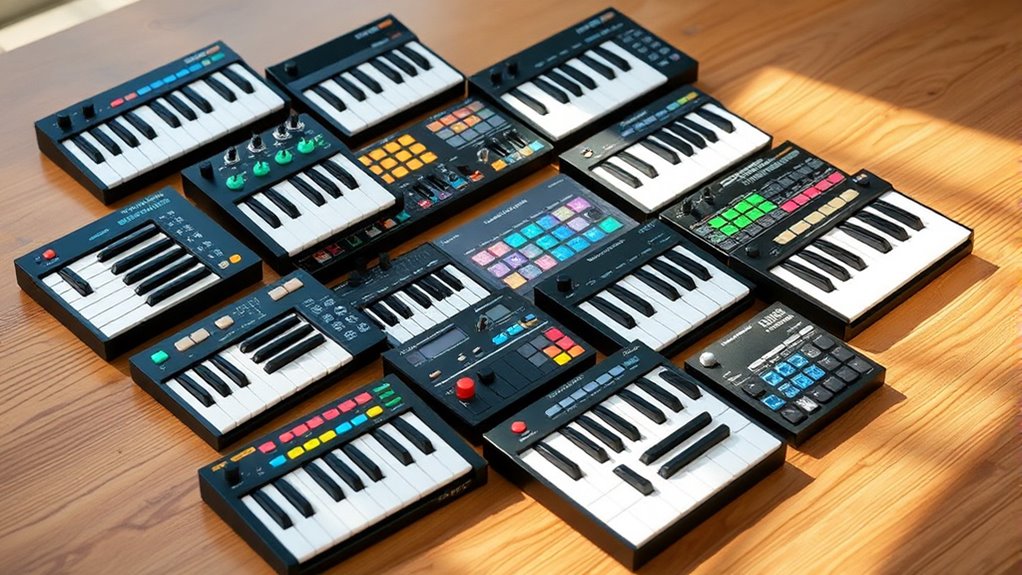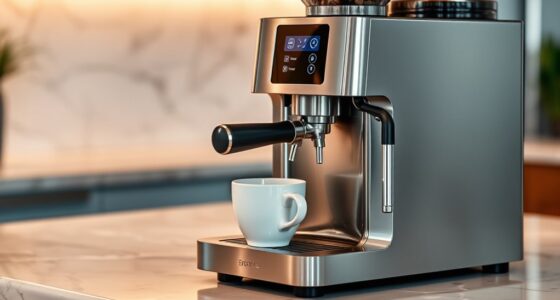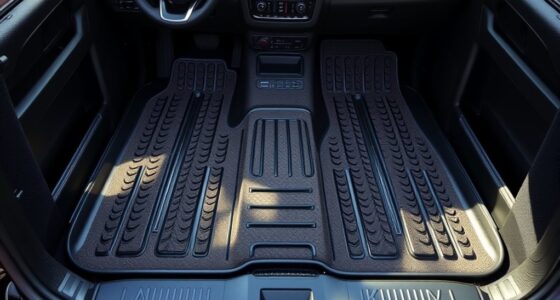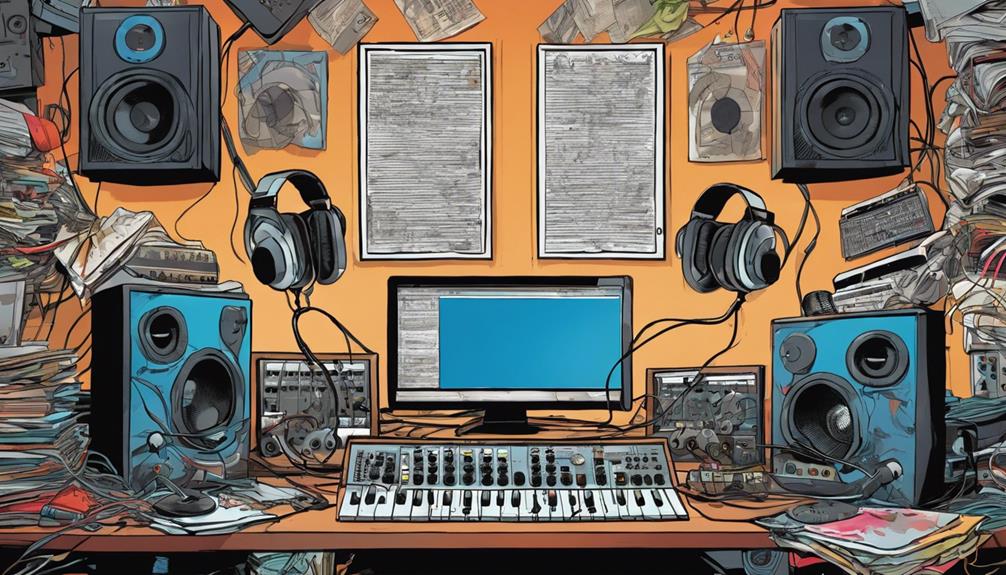If you’re after affordable MIDI keyboards under $150 that still deliver solid sound and features, I recommend checking out options like the Akai MPK Mini MK3, Costzon 61-Key Folding Piano, and M-Audio Keystation 49 MK3. These models offer good key action, various controls, and decent connectivity for their price. Whether you need portability, built-in sounds, or basic MIDI control, there’s something for you. Keep exploring to find the perfect fit for your musical journey.
Key Takeaways
- Many affordable MIDI keyboards under $150 include essential features like velocity-sensitive keys and assignable controls for versatile music production.
- Budget options often offer compact, portable designs suitable for beginners and mobile musicians on the go.
- Several models support connectivity via USB, MIDI, and Bluetooth, enabling seamless integration with DAWs and external devices.
- Entry-level MIDI controllers frequently come bundled with software and educational resources to enhance learning and creativity.
- While affordability limits some advanced features, many budget keyboards deliver good sound quality through compatible virtual instruments and apps.
Ktaxon 88 Key Digital Piano with Bluetooth MIDI and Accessories
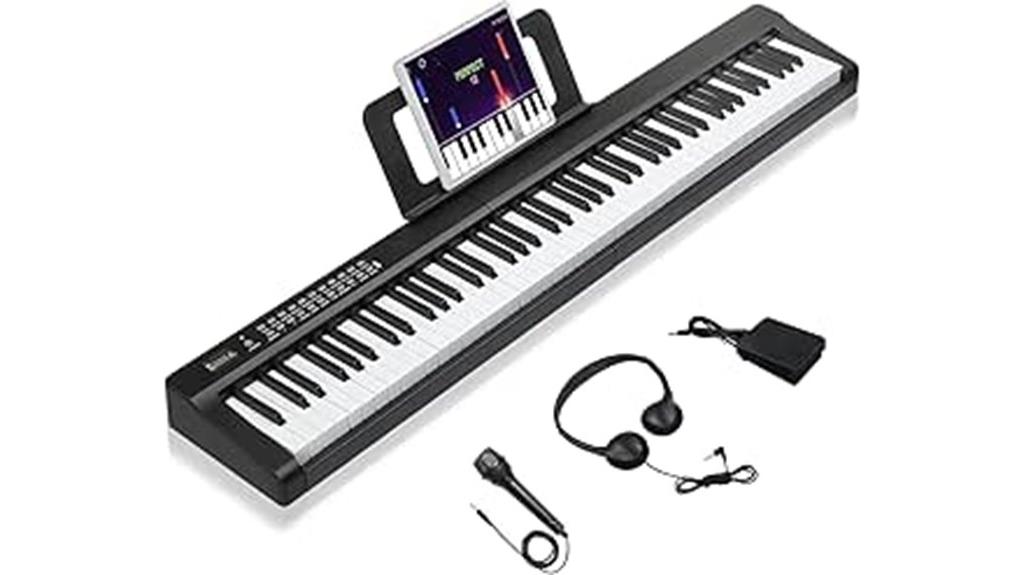
If you’re looking for an affordable MIDI keyboard that doesn’t compromise on features, the Ktaxon 88 Key Digital Piano is a great choice, especially for beginners and intermediate players. It offers 1000 rhythms, 150 demo songs, and 1000 tones like grand pianos, synth pads, and strings, perfect for diverse sound creation. The built-in metronome helps with timing, while dual high-fidelity speakers deliver immersive sound. It also features three teaching modes, split and dual keyboard functions, and supports wireless MIDI connection to apps. Plus, it includes useful accessories like a microphone, pedal, headphones, and more, making setup easy and versatile.
Best For: beginners and intermediate players seeking an affordable, feature-rich digital piano with versatile sound options and learning tools.
Pros:
- Extensive sound library with 1000 tones and 150 demo songs for creative versatility
- Multiple teaching modes and split/dual keyboard functions ideal for practice and learning
- Wireless MIDI connectivity and included accessories enhance usability and convenience
Cons:
- Battery-powered option may require additional purchase of batteries
- Limited advanced features for professional-level performance
- Some users might find the compact design less suitable for larger performance spaces
Digital Piano 88 Key Full Size Electronic Keyboard with Stand, Built-In Speakers, Sustain Pedal, Bluetooth, MIDI/USB/MP3
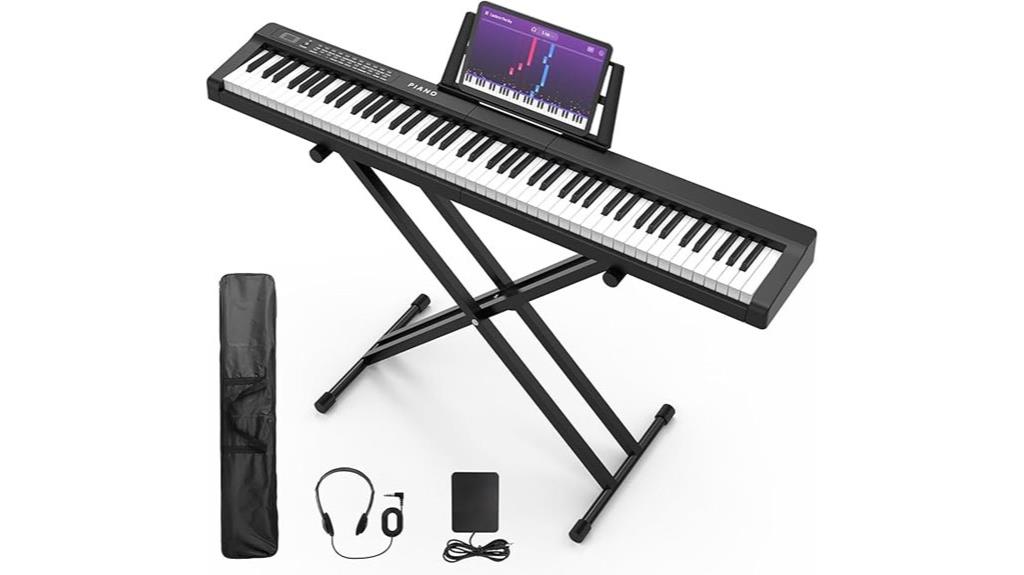
The Digital Piano 88 Key Full Size Electronic Keyboard is an excellent choice for beginners and intermediate players who want a realistic playing experience without breaking the bank. It features 88 semi-weighted keys that mimic a real piano’s touch, along with 200 rhythms, sounds, and demo songs for versatile practice. Bluetooth, MIDI, USB, and MP3 support make connecting to devices simple, while built-in speakers and a sustain pedal enhance playability. The sturdy stand, headphones, and included accessories create a complete setup. Users praise its sound quality, responsive keys, and value, making it ideal for learning, recording, and creative exploration at home.
Best For: beginner and intermediate piano players seeking a full-size, versatile digital keyboard with realistic feel and easy connectivity options.
Pros:
- Authentic 88 semi-weighted keys that closely simulate real piano touch
- Wide range of features including 200 sounds, rhythms, demo songs, and recording capabilities
- Easy to connect via Bluetooth, MIDI, USB, and support for MP3 playback for versatile practice and entertainment
Cons:
- Assembly of the stand can be confusing without detailed instructions
- Slight resistance in keys initially, which may require some adaptation for new players
- Limited color options, primarily available in black plastic
Roland GO:KEYS 3 Music Creation Keyboard

The Roland GO:KEYS 3 Music Creation Keyboard stands out as a versatile option for beginners and casual musicians seeking portability and a wide sound palette under $150. Weighing just 9.9 pounds, it’s lightweight, battery-powered, and perfect for on-the-go music making. Its Zen-Core engine delivers over 1000 sounds, including piano, synths, and effects, along with 200+ styles for auto-accompaniment. The intuitive interface, touch-sensitive keys, and Bluetooth connectivity make it easy to start creating right away. While the built-in speakers are suitable for casual use, external amplification enhances sound quality. Overall, it’s a flexible, fun instrument for exploring music anywhere.
Best For: beginners, casual musicians, and portable music creators seeking a versatile and affordable keyboard under $150.
Pros:
- Lightweight and portable, ideal for on-the-go use and easy setup
- Wide variety of sounds and styles powered by Roland’s Zen-Core engine, offering great versatility
- User-friendly interface with touch-sensitive keys and Bluetooth connectivity for quick music creation
Cons:
- Internal memory is limited, requiring external drives for additional sounds and styles
- Built-in speakers are small and may need external amplification for better sound quality
- Keybed may feel stiff or slippery, which could impact playability during complex performances
Weighted Keyboard Piano with Stand and Speakers
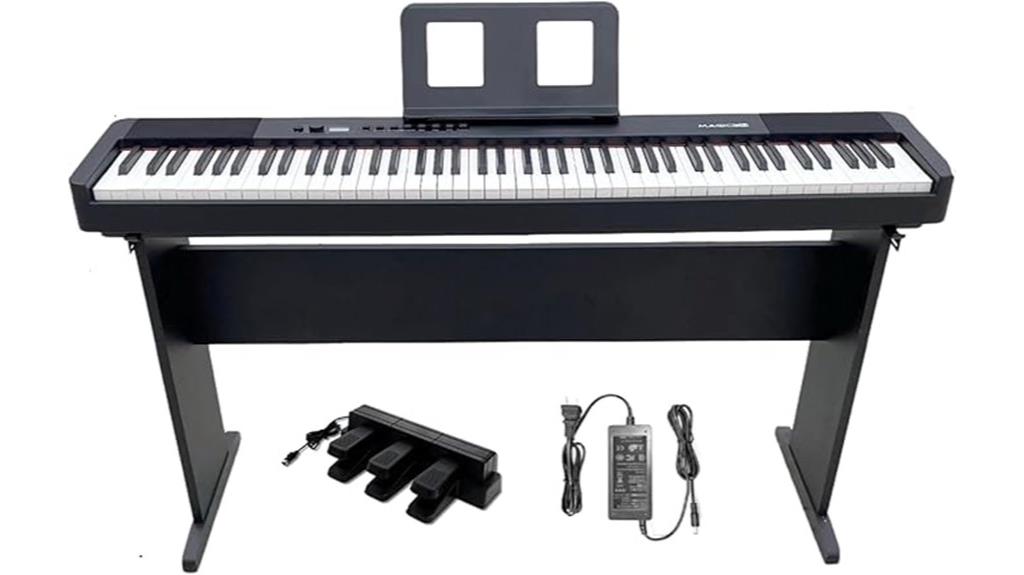
A weighted keyboard piano with a stand and speakers is an excellent choice for beginners or intermediate players who want a realistic piano feel without breaking the bank. It features an 88-key graded hammer action for authentic touch, full-size keys, and a sleek, slim profile that fits well in any space. The included stand, French Dream sound chip, triple pedals, and 25W speakers deliver rich, natural sound. With versatile connectivity options like Bluetooth, USB, and MIDI, plus built-in rhythms and demo patterns, it’s perfect for practice and creative projects. Its portability, thanks to battery support, makes it ideal for musicians on the go.
Best For: Beginner to intermediate musicians seeking a realistic, portable digital piano with rich sound and versatile connectivity options.
Pros:
- Authentic 88-key weighted hammer action for realistic piano feel
- Rich sound quality with French Dream sound chip and built-in speakers
- Portable design with battery support for outdoor and mobile use
Cons:
- May lack advanced features found in high-end digital pianos
- Limited customization options for sound and effects
- Heavier and bulkier compared to more compact portable keyboards
Akai Professional MPK Mini MK3 USB MIDI Keyboard Controller
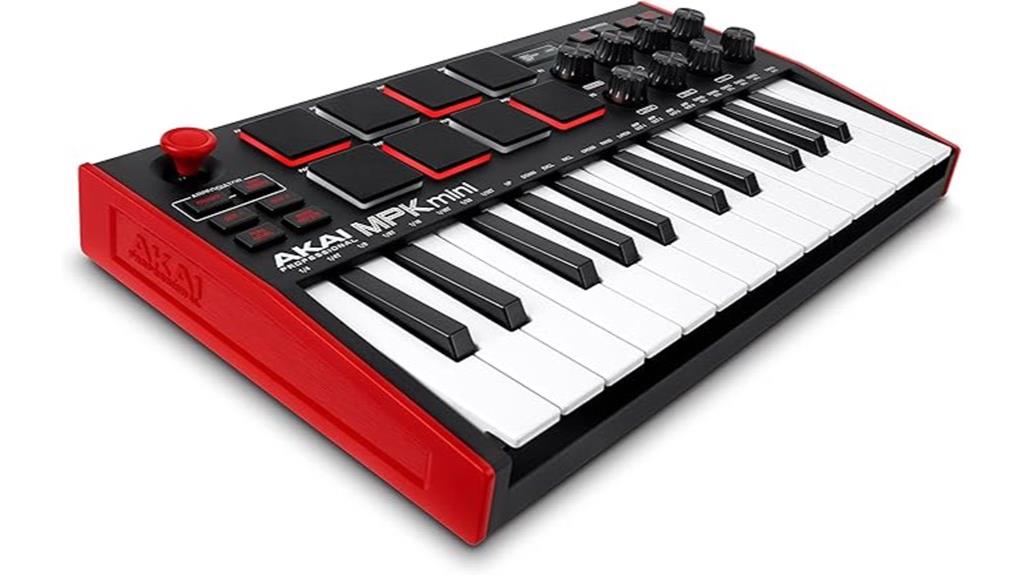
If you’re looking for a compact, versatile MIDI keyboard that balances affordability with professional features, the Akai Professional MPK Mini MK3 is an excellent choice. Weighing just 2 pounds, it offers 25 velocity-sensitive keys, 8 backlit MPC-style drum pads, and 8 assignable knobs, all within a portable design. The 4-way thumbstick controls pitch and modulation, while the OLED screen provides useful feedback. Its compatibility with Windows and Mac makes setup seamless, and the included software, like MPC Beats, expands your creative options. Whether you’re a beginner or a traveling musician, this controller delivers responsive performance and extensive customization at an affordable price.
Best For: beginners, traveling musicians, and producers seeking a portable, feature-rich MIDI controller at an affordable price.
Pros:
- Compact and lightweight design for easy portability
- Responsive velocity-sensitive keys and pads for dynamic play
- Seamless compatibility with major DAWs and included software bundle
Cons:
- Limited track capacity in the bundled MPC Beats software (8 MIDI, 2 audio)
- Plastic build may feel less durable over time
- No full-sized keys, which might be a drawback for some pianists
M-VAVE 25-Key USB MIDI Keyboard Controller with Drum Pads and Software
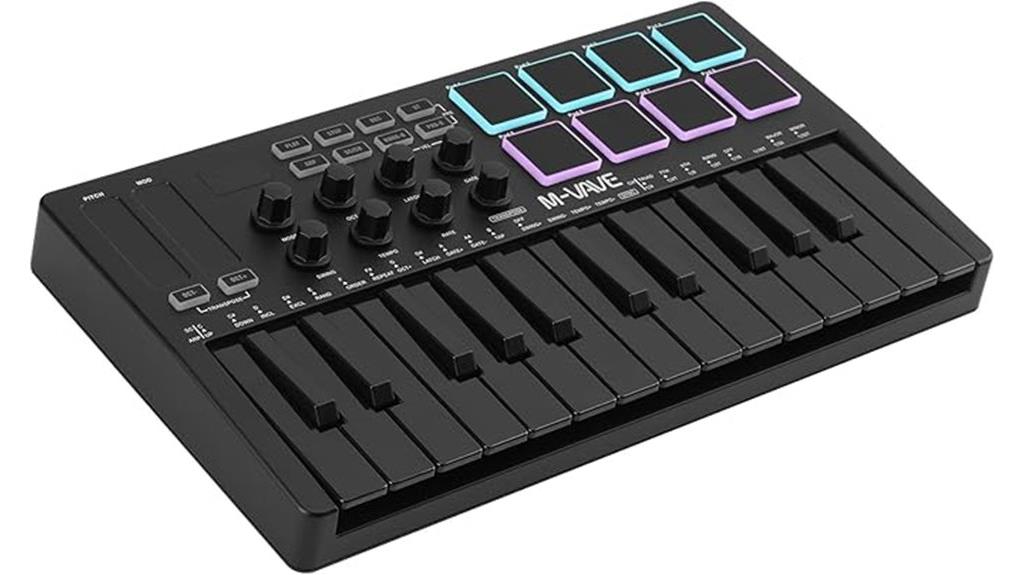
For musicians seeking a portable and versatile MIDI controller without breaking the bank, the M-VAVE 25-Key USB MIDI Keyboard Controller stands out thanks to its compact design and extensive features. It offers 25 velocity-sensitive mini keys, 8 RGB backlit pads, and 8 assignable rotary encoders, giving you precise control over your sounds. The device includes two capacitive touch strips for pitch bending and a semi-weighted keybed for a professional feel. It’s compatible with Windows, Mac, Android, iOS, and supports Bluetooth, plus its built-in battery ensures about 16 hours of wireless use. Perfect for studio, live, or mobile production, it’s a versatile, affordable option.
Best For: musicians, producers, and beat makers seeking a portable, versatile, and affordable MIDI controller for studio, live, or on-the-go music creation.
Pros:
- Compact and lightweight design for easy portability
- Extensive control options including velocity-sensitive keys, RGB pads, rotary encoders, and touch strips
- Broad compatibility with Windows, Mac, Android, iOS, and Bluetooth connectivity
Cons:
- Limited to 25 keys, which may not suit those needing a full-sized keyboard
- May require additional software setup for optimal use with certain DAWs
- Battery life of approximately 16 hours might be insufficient for extended sessions without recharging
Donner Mini MIDI Keyboard, 25-Key MIDI Controller for Beginners
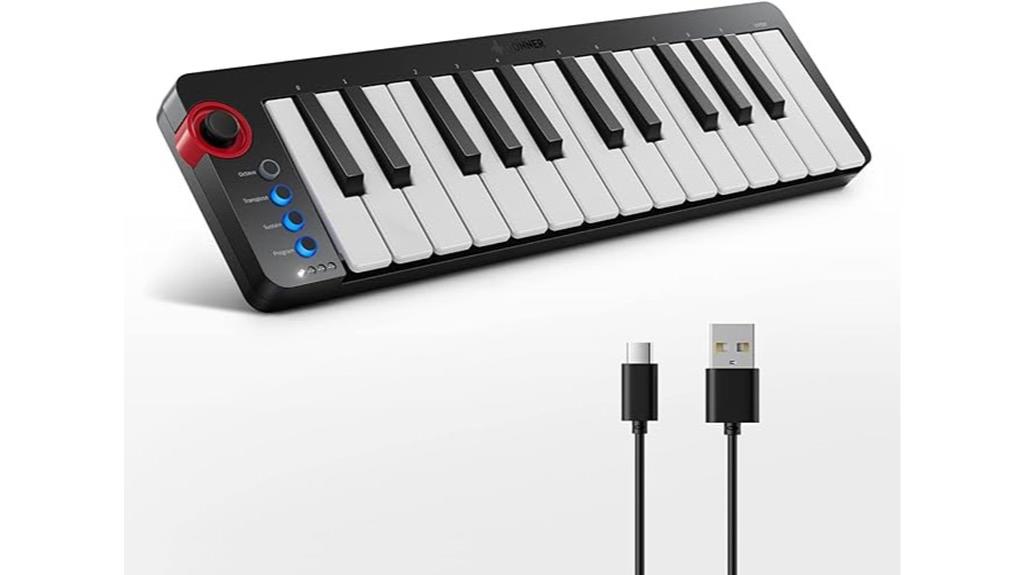
The Donner Mini MIDI Keyboard stands out as an ideal choice for beginners seeking an affordable yet versatile controller. Its 25 mini velocity-sensitive keys make it easy to create expressive melodies, while its compact size ensures portability for any setup. Light-up buttons give helpful visual feedback, and the pitch-bend wheel adds expressive control. It’s plug-and-play with Mac, PC, iOS, and Android devices, requiring no extra drivers. Compatible with popular DAWs like Ableton Live and Logic Pro, it also connects to smartphones via OTG adapters. Designed for beginners, it includes user-programmable banks, essential functions, and 40 educational courses to boost your learning and creativity.
Best For: beginners and aspiring music producers seeking an affordable, portable MIDI controller with educational support to enhance their music creation skills.
Pros:
- Compact, lightweight design ideal for portability and small setups
- User-friendly interface with essential functions and programmable banks
- Comes with 40 educational courses to support learning and skill development
Cons:
- Limited keys (25) may restrict complex compositions for advanced users
- No built-in sounds or software, requiring external DAWs for music production
- Basic features might lack the customization options preferred by experienced musicians
midiplus AKM320 Midi Keyboard Controller

The midiplus AKM320 Midi Keyboard Controller stands out as an excellent choice for beginners or musicians on a budget who need a reliable MIDI controller with essential features. It offers 32 velocity-sensitive keys, making it versatile for music production and MIDI control. The pitch and modulation wheels allow for expressive playing, while octave and transpose buttons provide quick range adjustments. Its compact design with a USB connection makes it easy to integrate into any setup. Made in Taiwan, this controller is straightforward, functional, and perfect for those starting out or looking for an affordable, feature-rich option without sacrificing quality.
Best For: beginners and budget-conscious musicians seeking a reliable, feature-rich MIDI keyboard controller for music production and MIDI control.
Pros:
- Velocity-sensitive 32 keys offer expressive playing dynamics
- Compact design with essential controls like pitch/mod wheels and octave/transpose buttons
- Plug-and-play USB connectivity for easy setup and integration
Cons:
- Lacks built-in sounds or advanced features found in higher-end controllers
- Does not include a sustain pedal, which may require additional purchase
- Limited octave range with only 32 keys may restrict more complex performances
Donner USB-C MIDI Keyboard Controller (DMK 25 Pro)
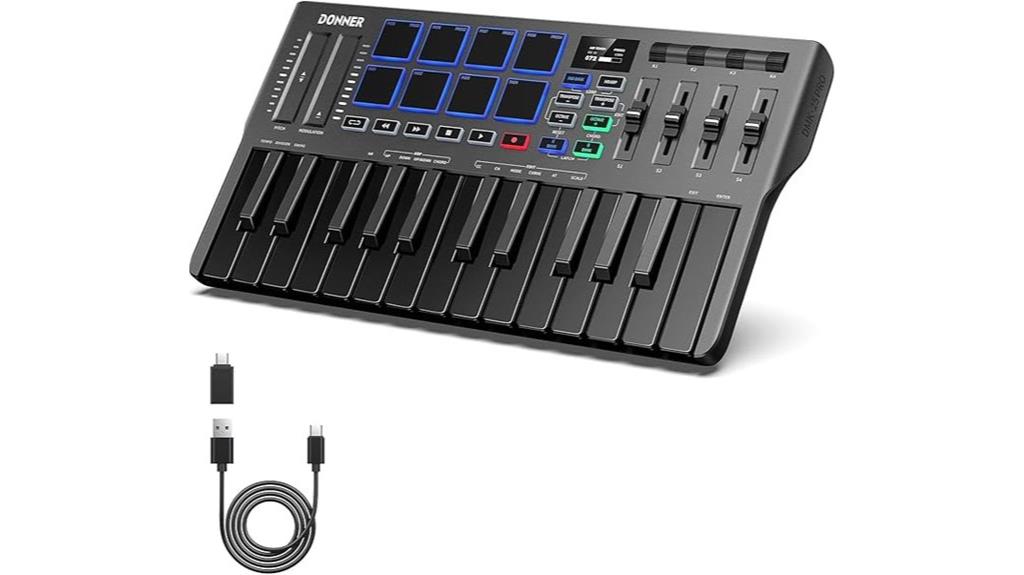
If you’re looking for an affordable, feature-packed MIDI controller, the Donner DMK 25 Pro stands out as an excellent choice for beginners and casual musicians. Its compact 25-key design makes it portable and easy to use on the go. It features 8 drum pads, an OLED display, smart scales, arpeggio, and chord functions, plus a personalized touch bar with light scale for intuitive control. The device supports real-time multi-mode control, including arpeggio and custom mapping, enhancing creativity. Compatible with PC, tablets, and smartphones via USB-C, it integrates well with popular DAWs. While setup can be tricky, its rich feature set offers great value for budget-minded music enthusiasts.
Best For: beginners, casual musicians, and music enthusiasts seeking an affordable, portable, feature-rich MIDI controller for on-the-go music production.
Pros:
- Compact and lightweight design for easy portability
- Rich set of features including smart scales, arpeggio, and teaching courses
- Compatible with various DAWs and devices via USB-C, supporting versatile setups
Cons:
- Setup and software installation can be complex and challenging, especially on Windows 10
- Some users report inconsistent velocity sensitivity on keys and drum pads
- Limited mobile app support and potential hardware issues like faulty cables
88-Key Semi-Weighted Keyboard Piano with MIDI, Bluetooth, 1000 Tones & Rhythms
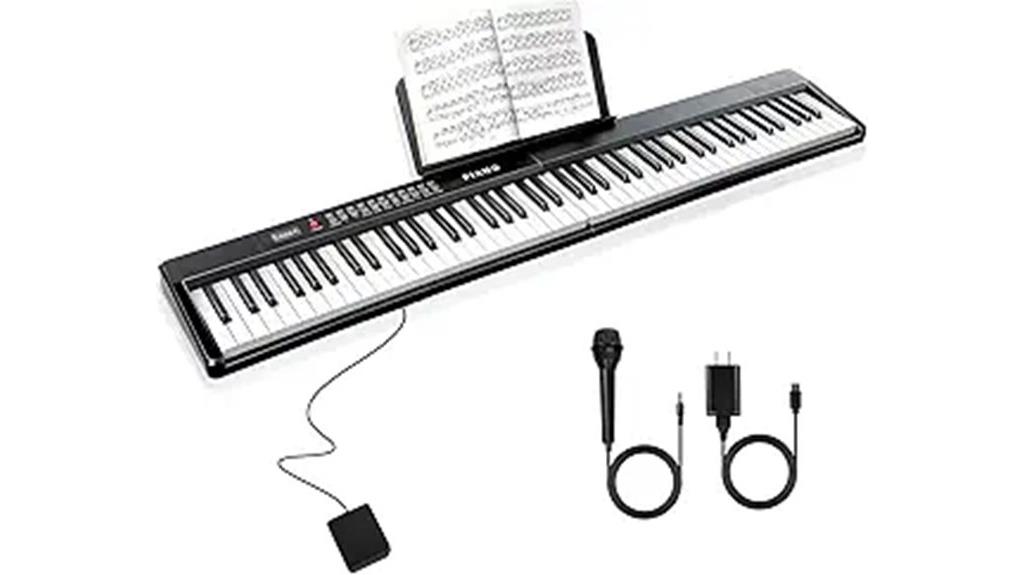
Ideal for beginners seeking a versatile and portable digital piano, this semi-weighted keyboard offers 88 keys that mimic the feel of an acoustic piano, making it easier to develop proper technique. It features Bluetooth, MIDI, and MP3 compatibility, allowing seamless connection to devices for recording and playback. With 1000 tones and rhythms, plus 150 demo songs, it’s perfect for exploring different styles. The foldable design makes transportation easy, while the included accessories—sustain pedal, microphone, and music stand—enhance practice sessions. Despite some durability concerns, it provides excellent value for those starting out and wanting a feature-rich, portable instrument under $150.
Best For: beginners and students seeking a portable, feature-rich digital piano to develop proper technique and explore diverse musical styles.
Pros:
- Mimics acoustic piano feel with semi-weighted 88 keys, ideal for learning proper technique
- Versatile connectivity options including Bluetooth, MIDI, and MP3 support for easy recording and playback
- Comes with a comprehensive accessory kit including sustain pedal, microphone, and music stand for enhanced practice
Cons:
- Durability issues reported with flimsy construction, headphone cushions, and music stand breakage
- Speakers and accessories may be of lower quality, affecting overall sound experience and longevity
- Foldable design can impact stability and may require careful handling during transport
Ktaxon Foldable 88-Key Electronic Piano Keyboard with Accessories
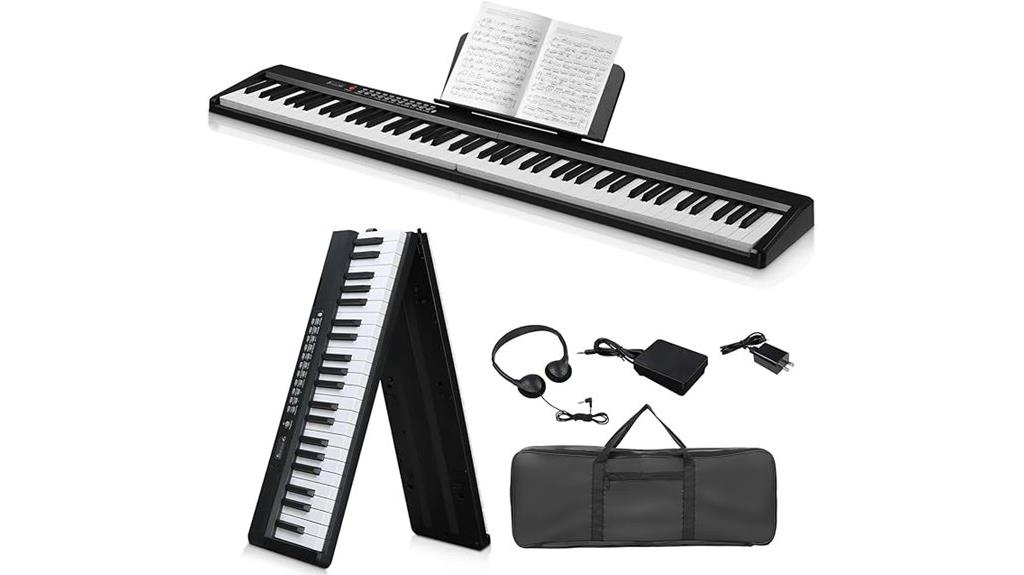
For musicians who need portability without sacrificing full-range keys, the Ktaxon Foldable 88-Key Electronic Piano Keyboard offers a standout solution. Its ultra-thin, foldable design makes it easy to carry, weighing just 5.1 lbs when folded, and comes with a padded bag for protection. Built from durable materials like PC, aluminum, and ABS, it’s both sturdy and lightweight. The keyboard features semi-weighted keys that mimic real piano feel, along with 1000 tones, 1000 rhythms, and 50 demo songs for versatile playing. Connectivity options like Bluetooth, USB, and MIDI make it perfect for practice, recording, and live performances anywhere.
Best For: musicians seeking a portable, full-range keyboard suitable for practice, recording, and performances on the go.
Pros:
- Ultra-thin, foldable design with lightweight construction (only 5.1 lbs when folded) for easy portability.
- Rich sound options with 1000 tones, 1000 rhythms, and 50 demo songs for versatile musical expression.
- Multiple connectivity options including Bluetooth, USB, and MIDI for seamless integration with devices and apps.
Cons:
- May lack the tactile feel of a traditional weighted piano keyboard.
- Limited to digital features; no acoustic sound or amplification.
- The foldable mechanism might require careful handling to ensure long-term durability.
GLARRY 88-Key Digital Piano with Weighted Hammer Action
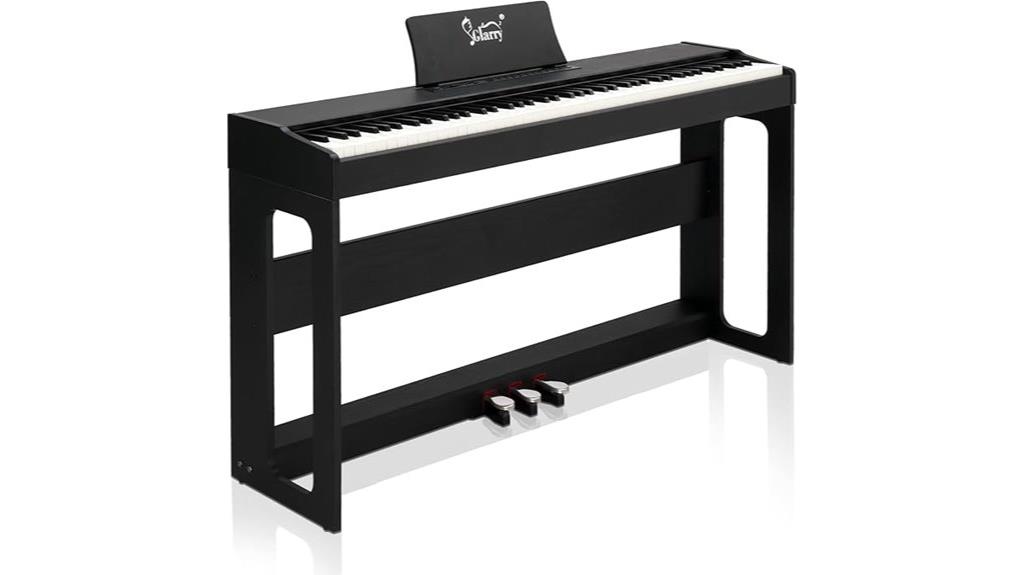
The GLARRY 88-Key Digital Piano with Weighted Hammer Action stands out as a top choice for beginners and intermediate players seeking an authentic piano feel without breaking the bank. Its full-weighted keys with hammer action mimic a traditional grand piano, providing a realistic touch. The sleek black design is portable, weighing around 55 pounds, making it easy to move and fit into any space. It features triple pedals—soft, sustain, and sostenuto—for expressive control. Plus, Bluetooth support for audio and MIDI lets you connect wirelessly to devices, making it versatile for practice, recording, and live performance. Overall, it offers great sound and features at a budget-friendly price.
Best For: beginners and intermediate players seeking an affordable, authentic-feeling digital piano with versatile connectivity options.
Pros:
- Realistic full-weighted keys with hammer action for an authentic playing experience
- Wireless Bluetooth support for audio and MIDI enhances connectivity and flexibility
- Portable design weighing around 55 pounds makes it easy to move and fit into various spaces
Cons:
- Limited advanced features compared to high-end digital pianos
- May lack some professional-grade sound customization options
- Assembled in China, which might concern some users regarding build quality
Costzon 61-Key Folding Piano Keyboard, Portable Electric Piano with Full Size Keys

A standout feature of the Costzon 61-Key Folding Piano Keyboard is its foldable, lightweight design, making it perfect for musicians on the go. Weighing only 5.5 lbs, it folds in half and comes with a sturdy carry bag, so you can easily take it anywhere. Its compact size (17.5” x 4.5” when folded) makes storage simple, whether at home, school, or outdoors. The full-sized semi-weighted keys mimic a real piano’s feel, responding dynamically to your touch. With built-in tones, rhythms, demo songs, and versatile connectivity options, it’s an excellent choice for beginners and casual players looking for portability without sacrificing features.
Best For: beginners, students, and casual musicians seeking a portable, feature-rich digital piano for practice and travel.
Pros:
- Lightweight and foldable design for easy transport and storage
- Full-sized semi-weighted keys that mimic real piano feel
- Versatile connectivity options including USB, MIDI, and audio inputs
Cons:
- Limited external amplification options may affect sound volume and quality
- Occasional issues with MIDI connectivity and feature limitations
- Sound quality and touch sensitivity can vary, impacting performance experience
61 Keys Digital Piano with Built-In Speakers, Microphone, Sheet Stand, and Power Supply
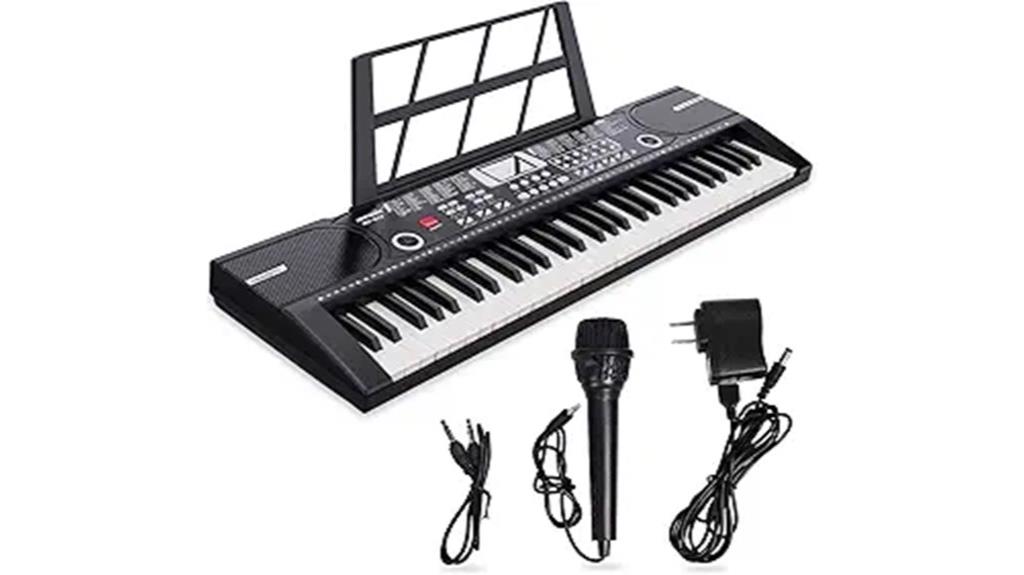
If you’re just starting out or looking for a versatile, portable keyboard, this 61-key digital piano with built-in speakers, microphone, sheet stand, and power supply offers everything you need. It features 100 rhythms, 10 demo songs, and fun animal sounds, making practice engaging. The multifunctional controls include volume, recording, and effects like sustain and vibrato. Equipped with a wired microphone and AUX input, it’s perfect for singing along or connecting external devices. Its lightweight design and battery or power adapter options make it ideal for at-home practice, travel, or small performances, combining portability with a rich feature set for beginners and hobbyists alike.
Best For: beginners, hobbyists, and families seeking a portable, versatile digital piano for practice, learning, and entertainment.
Pros:
- Combines multiple features including built-in speakers, microphone, and sheet stand for all-in-one convenience
- Lightweight and portable design suitable for travel, practice, and small performances
- Rich sound options with 100 rhythms, demo songs, and animal sounds enhance learning and fun
Cons:
- Slightly smaller size may be less suitable for those seeking a full-sized keyboard experience
- Batteries are not included, requiring an additional purchase for portable use
- Limited to 61 keys, which might not meet the needs of advanced players or those seeking a full-range piano
M-Audio Keystation 49 MK3 USB MIDI Keyboard Controller
https://m.media-amazon.com/images/I/61eJt0YGRbL._AC_SX679_.jpg
Designed for musicians and producers on a budget, the M-Audio Keystation 49 MK3 offers a 49-key MIDI controller that combines affordability with reliable performance. It features full-size, velocity-sensitive keys that feel natural and responsive, perfect for composing and virtual instrument control. The controller includes assignable controls, pitch and modulation wheels, and octave buttons, plus a sustain pedal input and transport controls for software navigation. Its compact, lightweight design makes it easy to transport and fits well on small desks or mobile setups. With plug-and-play USB connectivity and a software bundle including Ableton Live Lite and MPC Beats, it’s a versatile, user-friendly option for creating music.
Best For: musicians and producers on a budget seeking a reliable, portable MIDI controller with essential features for music creation and virtual instrument control.
Pros:
- Affordable price point with high value for money
- Full-size, velocity-sensitive keys for natural playability
- Easy plug-and-play USB connectivity with a comprehensive software bundle
Cons:
- No MIDI out port, limiting external hardware integration
- Keys are not weighted, which may not suit players seeking weighted action
- Slightly limited control options compared to higher-end MIDI controllers
Factors to Consider When Choosing a MIDI Keyboard Under 150
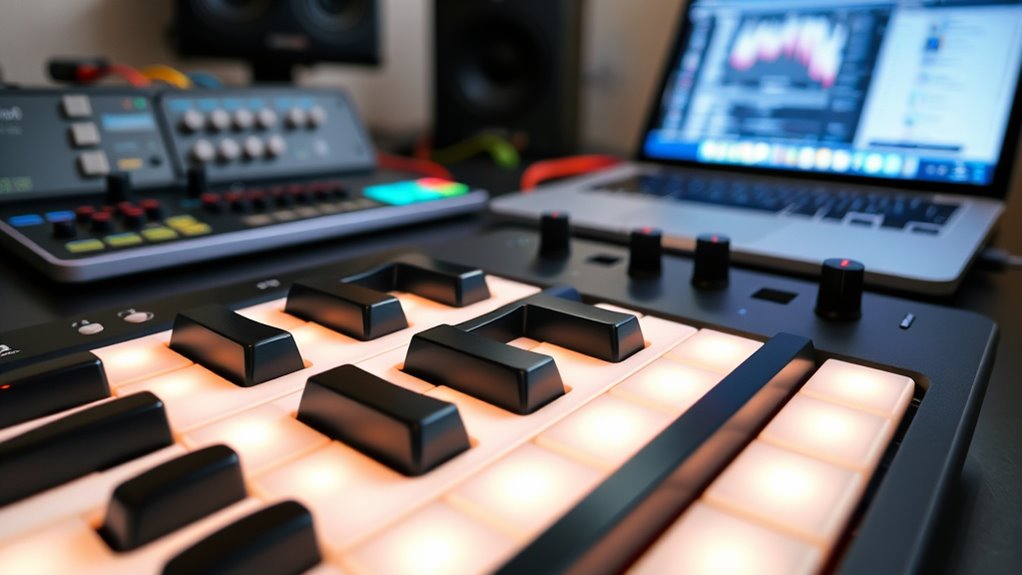
When choosing a MIDI keyboard under $150, there are key factors to keep in mind, like the number of keys and overall size to suit your setup. You should also consider build quality, portability, and how well it connects with your devices. Additionally, features like software, responsiveness, and how it feels to play can make a big difference in your experience.
Key Count and Size
Choosing the right MIDI keyboard under $150 largely depends on the key count and size that best suit your needs. Smaller models with 25 to 49 keys are perfect if you have limited space or need a portable setup. They’re easy to carry and fit into compact studios or on-the-go music production rigs. Larger options with 61 or 88 keys are ideal if you play piano or want a more authentic feel, especially with weighted keys that mimic the touch of an acoustic piano. Keep in mind that smaller keyboards often lack additional controls like knobs and pads, which are common on bigger models for more versatile production. Ultimately, your choice should reflect your musical style, space constraints, and whether portability or a full-range playing experience matters most.
Build and Portability
If portability is a priority, considering the build and weight of a MIDI keyboard under $150 is essential. Ideally, it should weigh less than 10 pounds for easy transport to gigs or studios. Compact designs with fewer keys, like 25 or 32, are lighter and more travel-friendly but may limit performance options. Features like foldable or detachable stands enhance portability without sacrificing core functionality. Built-in power options, such as USB bus power, make setup simpler and eliminate the need for external adapters, adding convenience. Smaller controllers often have streamlined controls to reduce bulk, making them perfect for on-the-go music creation. Overall, a lightweight, durable build combined with thoughtful design ensures your MIDI keyboard is both portable and functional.
Compatibility and Connectivity
Ensuring your MIDI keyboard connects smoothly with your devices is crucial, especially under a budget of $150. Look for models with compatible connectivity options like USB, MIDI DIN, or Bluetooth, so they work seamlessly with your computer, tablet, or smartphone. Confirm the device is plug-and-play with your operating system—Windows, macOS, iOS, or Android—to avoid extra drivers or software. Also, check if it supports protocols like MIDI, MIDI 2.0, or Bluetooth MIDI, which are essential for compatibility with your digital audio workstation or music apps. Versatile features like MIDI out ports or Bluetooth streaming can expand your setup options. Finally, verify that the MIDI keyboard works well with your preferred DAWs and software, ensuring full functionality for recording, editing, and performance.
Included Software and Features
When selecting a MIDI keyboard under $150, considering the software and features included can considerably expand your music-making potential. I look for bundles that offer DAWs, virtual instruments, or sound libraries, which save money and enhance creativity right away. It’s also important to evaluate features like arpeggiators, drum pads, and assignable controls, giving me more options without extra purchases. Compatibility matters too—software should support my operating system and integrate seamlessly into my workflow. I also check for firmware updates or downloadable content to keep my setup current and improve functionality. Lastly, educational resources or tutorials included in the package help me learn the software faster and maximize my investment, especially as a beginner.
Responsiveness and Feel
A MIDI keyboard’s responsiveness and feel are crucial because they directly affect how naturally and expressively you can play. I pay close attention to velocity-sensitive keys that accurately detect different pressures, allowing for dynamic performances. The feel of the keys, whether weighted, semi-weighted, or synth-action, influences how realistic my playing sounds and how easily I can express nuances. Adjustable touch sensitivity is a big plus, as it lets me tailor the response to my style. A smooth, consistent key action without lag or dead spots ensures seamless control over my music, making recording and live playing more effortless. High-quality responsiveness is essential for precise articulation, dynamics, and expressive techniques, helping me achieve professional-quality results even on a budget.
Additional Controls and Knobs
Additional controls like knobs, sliders, and buttons can markedly boost a MIDI keyboard’s versatility, making it easier to tweak sounds and effects on the fly. Many models under $150 come with assignable knobs and rotary encoders that can be mapped to effects, filters, and instrument parameters within your DAW, giving you real-time control. Dedicated transport buttons, octave switches, and modulation wheels can streamline your workflow and improve live performance. More control options mean greater expressive potential, especially when creating complex arrangements or manipulating virtual instruments. The number and type of these controls vary—some keyboards include up to 16 knobs, multiple buttons, and dedicated control surfaces tailored to different production needs. These features can substantially enhance your creative process without breaking the bank.
Price and Value
Choosing a MIDI keyboard under $150 requires balancing features and build quality to get the best value for your money. At this price point, many models offer essential features like velocity-sensitive keys and basic controls, making them great for beginners. Many also include bundled software or educational resources, boosting overall value without extra cost. However, it’s important to weigh build quality, as cheaper materials may affect durability over time. Features like Bluetooth connectivity, multiple assignable controls, or built-in drum pads can considerably increase value within this budget. By carefully evaluating the trade-off between cost and features, you can find a MIDI keyboard that delivers solid functionality and sound quality without overspending, ensuring you get the best possible value for your investment.
Frequently Asked Questions
Do Budget MIDI Keyboards Support Advanced Recording Features?
When it comes to budget MIDI keyboards, I’ve found that they often support basic recording features like note input and velocity control. However, advanced functions like automation, multiple zones, or extensive editing tend to be limited or absent in lower-priced models. Still, many affordable options provide enough functionality for beginners or simple projects, making them a great starting point without breaking the bank.
How Compatible Are These Keyboards With Popular DAWS?
You’re probably wondering how well budget MIDI keyboards work with popular DAWs. From my experience, most of these keyboards are highly compatible with major DAWs like Ableton Live, FL Studio, Logic Pro, and Cubase. They often use standard MIDI protocols, making setup straightforward. I’ve found that as long as you have the right drivers or plug-and-play features, you can enjoy seamless integration and smooth workflow without breaking the bank.
Can These Keyboards Be Used for Live Performances?
Imagine a trusty compass guiding you through a stormy sea—that’s how I see these keyboards for live performances. They’re portable, sturdy, and responsive, making it easy to craft sounds on the fly. While they might lack onboard sounds, I use them to control synths and software, seamlessly blending my performance. For solo gigs or band setups, these keyboards become my reliable allies, helping me express my music with confidence.
Do They Include Enough Controls for Complex Music Production?
You’re wondering if these budget MIDI keyboards have enough controls for complex music production. I can tell you they typically include essential features like knobs, pads, and sliders, which help manage different aspects of your tracks. While they might lack extensive control surfaces found on higher-end models, they’re usually more than capable for detailed editing, sequencing, and layering in your projects. So, yes, they’re suitable for intricate music creation.
Are There Any Limitations on Software or App Integration?
When it comes to software or app integration, I’ve found that budget MIDI keyboards often have limitations. Some may lack advanced mappings or seamless compatibility with certain DAWs, which can be frustrating. However, many models work well with popular software, and you can usually customize controls. Just keep in mind that lower-cost options might not offer the same level of integration as pricier keyboards, so it’s worth checking compatibility before buying.
Conclusion
Choosing the right MIDI keyboard under $150 is like finding a hidden gem—you get great sound and features without breaking the bank. Whether you prefer weighted keys, portability, or built-in sounds, there’s a perfect fit for you. Don’t let price fool you; these options prove that quality and affordability can go hand in hand. Plunge in, explore, and discover your musical potential—your next musical masterpiece is just a keyboard away!

